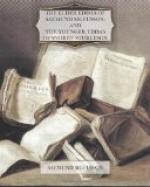Atli.
2. It grieves me, Gudrun! Giuki’s daughter! that in my palace here, Herkia has said, that thou and Thiodrek have under one covering slept, and wantonly been in the linen wrapt.
Gudrun.
3. For all this charge I will give my oaths by the white sacred stone, that with me and Thiodrek nothing has passed, which to man and wife only belongs;
4. Save that I embraced the prince of armies, the honoured king, a single time. Other were our cogitations, when sorrowful we two sat to converse.
5. Hither came Thiodrek, with thirty warriors; now there lives not one of those thirty men. Surround me with thy brothers, and with mailed warriors; surround me with all thy noblest kinsmen.
6. Send to Saxi the Southmen’s prince; he can hallow the boiling cauldron.”
7. Seven hundred men entered the hall, ere in the cauldron the queen dipt her hand.
8. “Now Gunnar comes not, nor call I Hogni: I shall not see again my loved brothers: with his sword would Hogni such wrong avenge: now I must myself purify from crime.”
9. She to the bottom, plunged her snow-white hand, and up she drew the precious stones.[91] “See now, ye men! I am proved guiltless in holy wise, boil the vessel as it may.”
10. Laughed then Atli’s heart within his breast, when he unscathed beheld the hand of Gudrun. “Now must Herkia to the cauldron go, she who Gudrun had hoped to injure.” No one has misery seen who saw not that, how the hand there of Herkia was burnt. They then the woman led to a foul slough.[92] So were Gudrun’s wrongs avenged.
FOOTNOTES:
[Footnote 90: Herkia, the Erka or Helche of the German tradition, who here appears as a slave or servant, is, according to that tradition, the queen of Etzel or Atli, who did not marry Kreimhilt (Gudrun) until after her death. The falsification of the story, the pitiful subordinate part acted by Thiodrek, the perfect silence of all the other poems on this event, and the ordeal of the cauldron, sufficiently show that the poem is a later composition. P.E. Muller (II., p. 319) ascribes it to Saemund himself.]
[Footnote 91: The iarknastein of the original was a milk-white opal.]
[Footnote 92: This punishment was known to the old Germans.]
ODDRUN’S LAMENT.
There was a king named Heidrek, who had a daughter named Borgny. Her lover was named Vilmund. She could not give birth to a child until Oddrun, Atli’s sister, came. She had been the beloved of Gunnar, Giuki’s son. Of this story it is here sung:
1. I have heard tell, in ancient stories how a damsel came to the eastern land: no one was able, on the face of earth, help to afford to Heidrek’s daughter.
2. When Oddrun, Atli’s sister, heard that the damsel had great pains, from the stall she led her well-bridled steed, and on the swart one the saddle laid.




